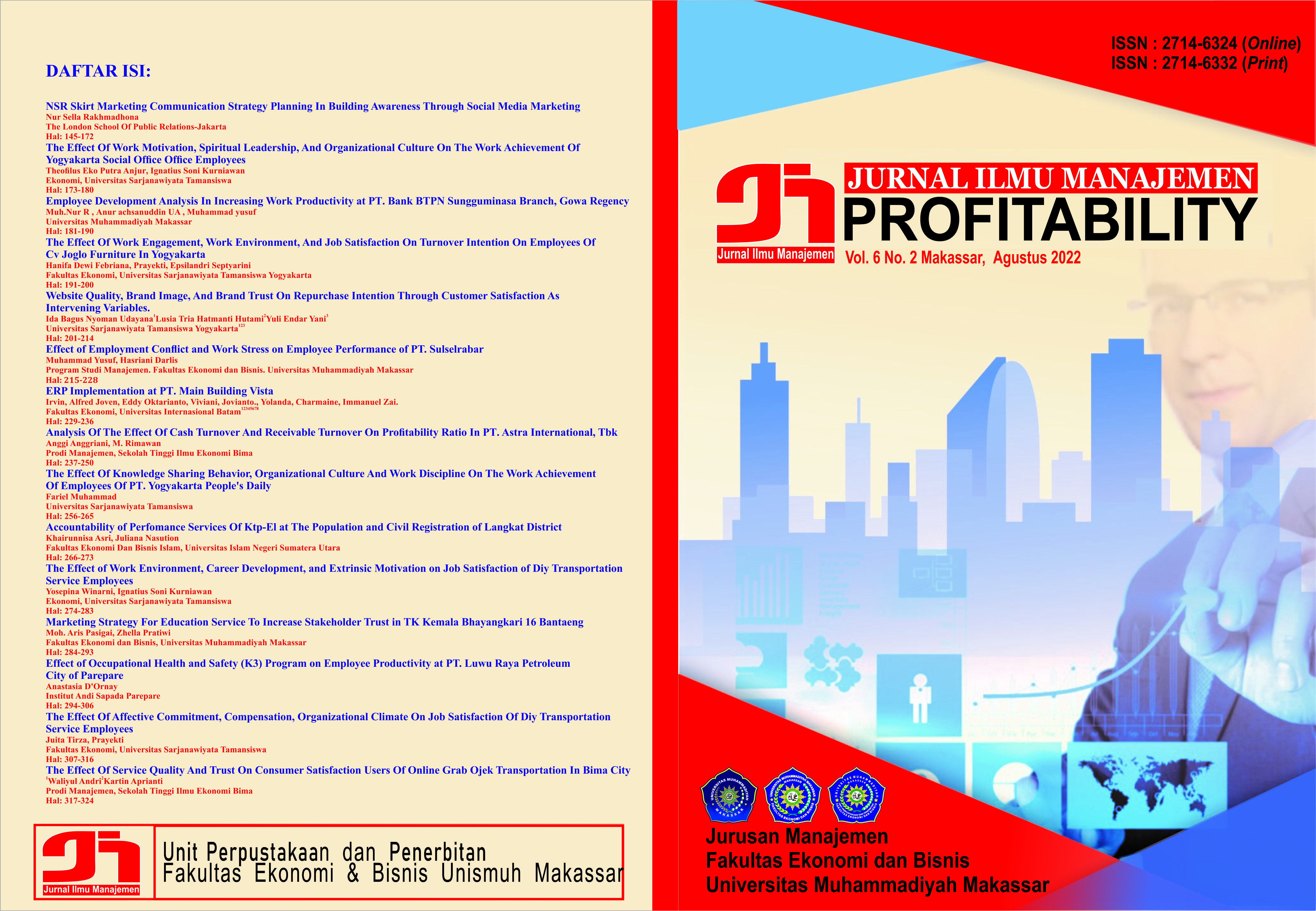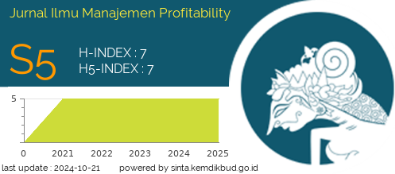The PKHs’ Implementation in Enhancing the Welfare Floating Houses in Makassar City
DOI: https://doi.org/10.26618/profitability.v9i1.16705
Implementation Concept, Family Hope, Program (PKH), The Concept of Welfare, The Concept of Powerty.
Abstract
One of the government’s policies to address poverty is the Program Keluarga Harapan (PKH). The program aims to improve the socioeconomic, educational, and health conditions of poor communities. This study employed a descriptive qualitative research method, with data collected through observation and in-depth interviews. The findings indicate that the implementation of PKH in the Floating House community of the Fishermen Village in Tallo Subdistrict, Tallo District, Makassar City, has received support from various stakeholders, particularly the Tallo Subdistrict government. The recipients have shown considerable enthusiasm for the program. However, this research is urgent to evaluate the actual impact of PKH on improving the welfare of coastal communities with limited economic opportunities, education, and healthcare access. While the program has gained positive responses, challenges remain in ensuring its sustainability and effectiveness in breaking the cycle of poverty. Therefore, this study is essential to identify existing obstacles in program implementation and offer recommendations for enhancing its effectiveness. The findings are expected to contribute to policy development, ensuring that PKH and similar social assistance programs are better targeted and more impactful in reducing poverty, particularly among vulnerable fishing communities.References
Agustino, L. (2006). Fundamentals of Public Policy. Bandung: CV. Alfabeta.
Badan Kependudukan dan Keluarga Berencana Nasional. (2018). Poverty Indicators (Online). Retrieved December 15, 2018, from http://www.bkkbn.go.id/datadaninformasi/materi/
Badan Pusat Statistik Republik Indonesia. (2018). Statistics Indonesia 2018. Jakarta Pusat: Badan Pusat Statistik.
Departemen Pendidikan dan Kebudayaan. (1997). Kamus Besar Bahasa Indonesia (The Big Indonesian Dictionary). Jakarta: Balai Pustaka.
Emzir. (2012). Qualitative Research Methods: Data Analysis. Jakarta: PT. Raja Grafindo Persada.
Herdiansyah, H. (2013). Interviews, Observations, and Focus Groups as Instruments for Controlling Qualitative Data. Jakarta: Raja Grafindo Persada.
Kasiram, M. (2010). Research Methodology: Reflection on the Development of Research Methodology Understanding and Mastery. Malang: UIN-MALIKI PRESS.
Kementerian Sosial RI. (2016). Training on the Family Hope Program. Jakarta: Kementerian Sosial.
Khomsan, A., et al. (2015). Poverty Indicators and the Misclassification of the Poor. Jakarta: Yayasan Pustaka Obor Indonesia.
Nugroho, D. R. (2006). Public Policy for Developing Countries. Jakarta: PT Alex Media Komputindo.
Simanjuntak, M. (2010). Factors Affecting Family Welfare and Children’s Academic Achievement in Families Receiving the Family Hope Program. Bogor: IPB.
Sodiq, A. (2015). The Concept of Welfare in Islam. Equilibrium, 3(2), 380-405.
Sugiyono. (2008). Understanding Qualitative Research. Bandung: CV. Alfabeta.
Sugiyono. (2014). Quantitative, Qualitative, and R&D Research Methods. Bandung: Alfabeta.
Suharto, E. (2009). Public Policy Analysis: A Practical Guide to Analyzing Social Problems and Policies. Bandung: CV. Alfabeta.
Sukandarrumidi. (2012). Research Methodology: A Practical Guide for Beginner Researchers. Yogyakarta: Gadjah Mada University Press.
Sutaryo. (2004). Fundamentals of Socialization. Jakarta: Rajawali Press.
Tim Nasional Percepatan Penanggulangan Kemiskinan. (2011). Guide to Poverty Reduction: Official Handbook for Regional TNP2K. Jakarta: Tim Nasional Percepatan Penanggulangan Kemiskinan.
Tim Nasional Percepatan Penanggulangan Kemiskinan. (2017). General Guide to the Family Hope Program: Achieving Prosperous Families. Jakarta: Kementerian Sosial RI.
Wahab, S. A. (2012). Policy Analysis: From Formulation to Implementation. Jakarta: Bumi Aksara.
Widodo, J. (2006). Public Policy Analysis: Concepts and Applications of Public Policy Process Analysis. Sidoarjo: Bayumedia Publishing.
Winarno, B. (2014). Public Policy: Theory, Process, and Case Studies. Yogyakarta: Caps Publishing.
Winarno Surakhmad, B. (2001). Introduction to Teaching-Learning Interaction: Basics and Techniques of Teaching Methodology. Bandung: Tarsito.
Downloads
Published
Issue
Section
License
Authors who publish with Jurnal Ilmu Manajemen Profitability agree to the following terms:
Copyright of the articles remains with the authors.
Authors grant the journal the right of first publication with the work simultaneously licensed under a Creative Commons Attribution-NonCommercial 4.0 International License (CC BY-NC 4.0). This license allows others to:
Share (copy and redistribute the material in any medium or format)
Adapt (remix, transform, and build upon the material)
as long as they give appropriate credit to the original author(s) and source, provide a link to the license, and indicate if changes were made. Non-commercial use only.
Authors are permitted to:
Distribute their published work (e.g., post it to an institutional repository or publish it in a book), with an acknowledgment of its initial publication in this journal.
Enter into separate, additional contractual arrangements for the non-exclusive distribution of the journal’s published version of the work (e.g., post it to a class website or institutional archive).
For permissions to use the content published in this journal beyond the scope of the license (e.g., commercial purposes), please contact the editorial office via the journal email.
License Details:
This journal is licensed under a Creative Commons Attribution-NonCommercial 4.0 International License (CC BY-NC 4.0).












